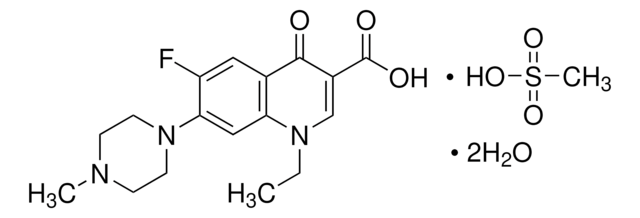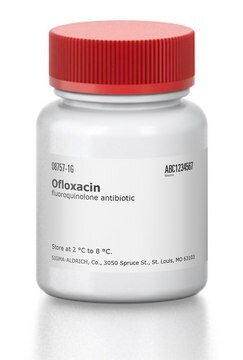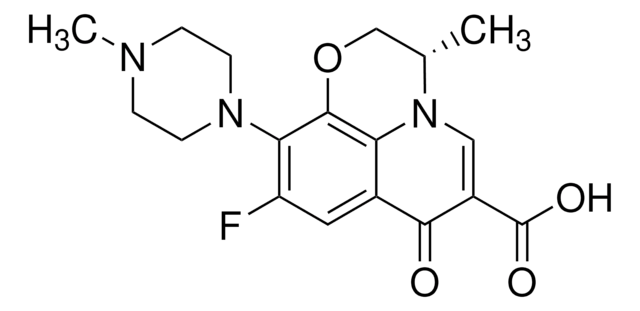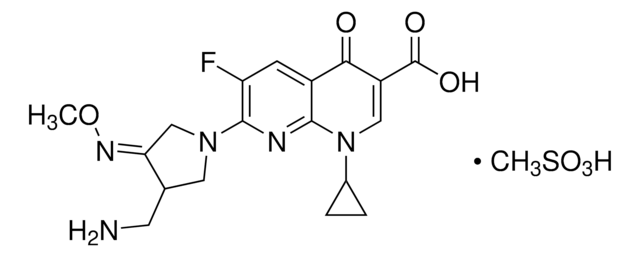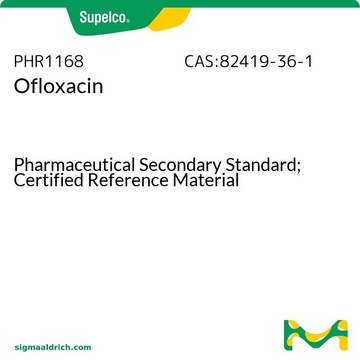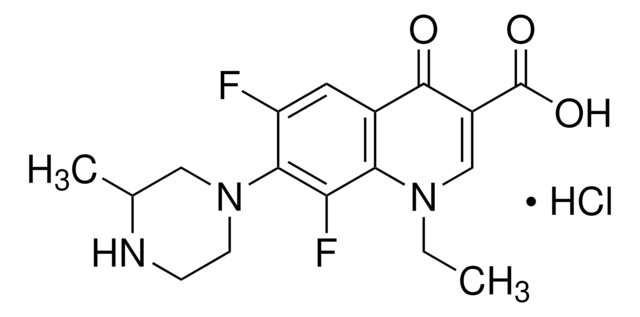P0106
Pefloxacin mesylate dihydrate
Synonym(s):
3-Quinolinecarboxylic acid, 1-ethyl-6-fluoro-1,4-dihydro-7-(4-methyl-1-piperazinyl)-4-oxo-, monomethanesulfonate, dihydrate, Pefloxacine monomethanesulfonate dihydrate, Pefloxacinium methanesulfonate dihydrate
About This Item
Recommended Products
form
powder
solubility
H2O: 50 mg/mL
antibiotic activity spectrum
Gram-negative bacteria
Gram-positive bacteria
Mode of action
DNA synthesis | interferes
enzyme | inhibits
storage temp.
2-8°C
SMILES string
O.O.CS(O)(=O)=O.CCN1C=C(C(O)=O)C(=O)c2cc(F)c(cc12)N3CCN(C)CC3
InChI
1S/C17H20FN3O3.CH4O3S.2H2O/c1-3-20-10-12(17(23)24)16(22)11-8-13(18)15(9-14(11)20)21-6-4-19(2)5-7-21;1-5(2,3)4;;/h8-10H,3-7H2,1-2H3,(H,23,24);1H3,(H,2,3,4);2*1H2
InChI key
LEULAXMUNMRLPW-UHFFFAOYSA-N
Looking for similar products? Visit Product Comparison Guide
General description
Application
Biochem/physiol Actions
Other Notes
Signal Word
Warning
Hazard Statements
Precautionary Statements
Hazard Classifications
Eye Irrit. 2
Storage Class Code
11 - Combustible Solids
WGK
WGK 3
Flash Point(F)
Not applicable
Flash Point(C)
Not applicable
Personal Protective Equipment
Regulatory Listings
Regulatory Listings are mainly provided for chemical products. Only limited information can be provided here for non-chemical products. No entry means none of the components are listed. It is the user’s obligation to ensure the safe and legal use of the product.
JAN Code
P0106-VAR:
P0106-BULK:
P0106-50G:
P0106-10G:
Certificates of Analysis (COA)
Search for Certificates of Analysis (COA) by entering the products Lot/Batch Number. Lot and Batch Numbers can be found on a product’s label following the words ‘Lot’ or ‘Batch’.
Already Own This Product?
Find documentation for the products that you have recently purchased in the Document Library.
Customers Also Viewed
Our team of scientists has experience in all areas of research including Life Science, Material Science, Chemical Synthesis, Chromatography, Analytical and many others.
Contact Technical Service